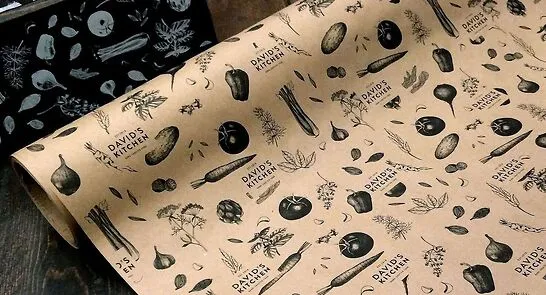Deli paper, regularly neglected as a insignificant kitchen staple, is distant more than its modest appearance recommends. This uncoated, grease-resistant paper has unobtrusively played a urgent part in nourishment arrangement, conservation, and introduction for decades. It’s time to sparkle a highlight on this humble however flexible fabric and investigate its bunch employments, benefits, and the science behind its effectiveness.
Understanding deli paper
Custom Deli paper for restaurant, moreover known as waxed paper, is a sort of paper coated with a lean layer of mineral oil or paraffin wax. This coating confers its interesting properties:
Grease Resistance: The wax makes a boundary that avoids oil and dampness from leaking through, keeping your nourishment new and your countertops clean.
Non-Stick Surface: The smooth, waxed wrap up avoids nourishment from following, making cleanup a breeze and guaranteeing your prepared merchandise hold their shape.
Flexibility: Store paper is flexible and simple to handle, making it idealize for wrapping, lining, and covering different nourishment items.
The Science Behind Store Paper
The science behind deli paper’s adequacy lies in the properties of wax. When connected to paper, the wax makes a hydrophobic layer, repulsing water and oil-based substances. This avoids nourishment from staying and permits for simple discharge without compromising the astuteness of the paper.
Versatile Employments of Store Paper
Deli paper’s flexibility knows no bounds. Here are a few of its most common applications:
Food Wrapping: deli paper is perfect for wrapping sandwiches, burgers, and other grab-and-go things. Its grease-resistant properties keep your nourishment new and avoid wet bread.
Baking: Line heating sheets and container with deli paper to avoid staying and make cleanup easy. It’s idealize for treats, baked goods, and broiled vegetables.
Food Capacity: Wrap scraps in deli paper to keep them new and anticipate cooler burn.
Parchment Paper Substitute: Whereas not as heat-resistant as material paper, deli paper can be utilized in a squeeze for lining heating dishes and roasting.
Creative Employments: Get imaginative with deli paper by utilizing it for creating, blessing wrapping, or indeed as a defensive layer for fragile surfaces.
Deli Paper vs. Material Paper: Key Differences
While regularly utilized traded, deli paper and material paper have particular characteristics:
Coating: Store paper is waxed, whereas material paper is silicone-treated.
Heat Resistance: Material paper can withstand higher temperatures, making it reasonable for preparing and simmering at tall warm. deli paper is best for lower-temperature applications.
Grease Resistance: Both are grease-resistant, but material paper offers marginally way better protection.
Cost: Store paper is for the most part more reasonable than material paper.
Eco-Friendly Options: There are biodegradable and recycled deli paper options available, supporting environmentally sustainable practices.
Versatile: Deli paper can be used for various purposes, including wrapping food, lining trays or baskets, and separating layers of food items.
Enhances Presentation: It improves the visual appeal of food, making it look more attractive and appetizing.
Choosing the Right Store Paper
Deli paper comes in different thicknesses and sizes. Consider the taking after variables when selecting the right product:
Thickness: Thicker deli paper is more tough and appropriate for wrapping bigger items.
Size: Select a measure that fits your needs, whether it’s for sandwich wrapping or heating sheets.
Brand: Trustworthy brands frequently offer reliable quality and performance.
Environmental Considerations
While store paper is for the most part recyclable, it’s fundamental to check nearby reusing rules as not all offices acknowledge waxed paper. To minimize natural affect, consider utilizing reusable choices like beeswax wraps or silicone preparing mats at whatever point possible.
Conclusion
Custom Butcher Paper is an unsung saint in the kitchen, advertising a large number of benefits without breaking the bank. Its grease-resistant, non-stick, and adaptable properties make it an vital apparatus for nourishment planning, capacity, and introduction. By understanding the science behind deli paper and investigating its flexible employments, you can hoist your culinary involvement whereas minimizing waste.
Deli paper, a versatile and essential item in the food industry, plays a crucial role in maintaining hygiene, preserving freshness, and enhancing presentation. Its grease-resistant and non-stick properties make it ideal for wrapping sandwiches, burgers, and baked goods, preventing them from becoming soggy or unappealing. The convenience of deli paper extends to both the consumer and the food service provider, as it is easy to handle, disposable, and cost-effective. Furthermore, deli paper often features branding or decorative designs, adding a personal touch to the dining experience.
Beyond its functional uses, deli paper contributes to environmental sustainability when sourced from recycled or biodegradable materials. As the food industry increasingly adopts eco-friendly practices, the role of deli paper evolves to align with these goals, offering an alternative to plastic wraps and other non-recyclable packaging.
Additional Tips and Tricks:
For additional security, double-layer deli paper when wrapping food.
Use store paper to make fun and happy nourishment introductions for parties and picnics.
Experiment with distinctive sorts of store paper to discover the idealize one for your needs.
Compost any nourishment scraps wrapped in deli paper to decrease waste.
By joining deli paper into your kitchen schedule, you’ll find a world of conceivable outcomes and appreciate the comfort and benefits it offers.


